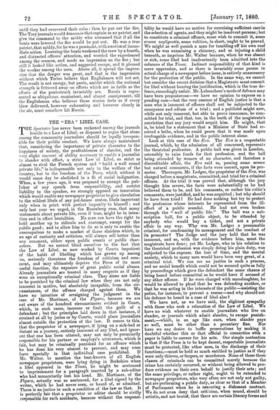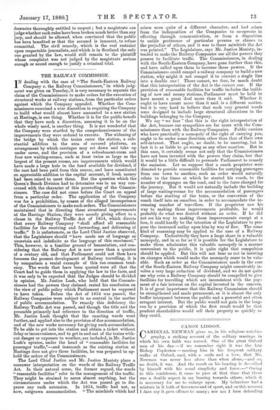THE " ERA " LIBEL CASE. T HE Spectator has never
been reckoned among the journals hostile to a Law of Libel, or disposed to argue that alone among the community journalists should be legally irrespon- sible for their public conduct. We have always maintained that, considering the importance of private character to the happiness of society, the profitableness of slander, and the very slight amount of ability necessary to enable a journalist to slander with effect, a strict Law of Libel, so strict as almost to rival the French system and " build a wall round private life," is indispensable not only to the welfare of the country, but to the freedom of the Press, which without it would some day be abolished in a fit of social indignation. When, a few years ago, it was proposed to exempt the pub- lisher of any speech from responsibility, and restrict liability to the speaker, we strongly opposed an innovation which would enable any newspaper proprietor to give circulation to the wildest libels of any pot-house orator, libels important only when in print, with perfect impunity to himself ; and only last year we urged, in the Rosenberg case, that many statements about private life, even if true, might be in inten- tion and in effect brutalities. No man can have the right to hold another up to ridicule and contempt, except for the public good ; and to allow him to do so is only to enable the unscrupulous to make a market of those slanders which, in an age of curiosity and criticism, will always sell better than any comment, either upon public events or public char- acters. But we cannot blind ourselves to the fact that the Law of Libel, as now worked by Courts impatient of the habit of libelling which has grown up among us, seriously threatens the freedom of criticism and com- ment, and may ultimately deprive the Press of its most useful function, the exposure of great public social abuses. Already journalists are treated in many respects as if they were an exceptionally criminal class. They alone are liable to be punished by the criminal law when they are not only innocent in motive, but absolutely incapable, from the cir- cumstances, of the offence charged against them. We have no intention of arraigning the judgment in the case of Mr. Mortimer, of the Figaro, because we are not aware of the hundred circumstances evident in Court, which, in such cases, increase or limit the guilt of a defendant ; but the principles laid down in that instance if strained at all by juries or by Courts, would place journalists almost outside the protection of the law. It comes to this, that the proprietor of a newspaper, if lying on a sick-bed or distant on a journey, entirely innocent of any libel, and ignor- ant that one has been uttered, may not only be pecuniarily responsible for his partner or employe's utterances, which is fair, but may be criminally punished for an offence which he has done his very utmost to prevent, and may even have specially in that individual case prohibited. If Mr. Walter, to mention the best-known of all English newspaper proprietors, were lying dying in Berkshire when a libel appeared in the Times, he might be sentenced to imprisonment for a paragraph inserted by a sub-editor who had momentarily lost his head. Mr. Mortimer, of the Figaro, actually was so sentenced, for a libel signed by the writer, which he had never seen, or heard of, or admitted. There is no justice in such a condition of the law as that. It is perfectly fair that a proprietor or editor should be civilly ,responsible for such accidents, because without the responsi- billy he would have no motive for exercising sufficient care in the selection of agents, and they might be insolvent persons ; but to constitute a criminal offence, some wish to commit it, some crassa negligentia, some volition, in short, ought to be proved. We might as well punish a man for tumbling off his own roof when he was examining a chimney, and so injuring a child beneath, as imprison Mr. Walter because, when he was absent or sick, some libel had inadvertently been admitted into the columns of the Times. Indirect responsibility of that kind is mere oppression, and as there is invariably some person in actual charge of a newspaper before issue, is entirely unnecessary for the protection of the public. In the same way, we cannot but consider the recent decision that a Magistrate must commit for libel without hearing the justification, which is the true de- fence, exceedingly unfair. Mr. Labouchere's mode of defence may have been preposterous—we have no opinion to express on a pending case—but the very essence of English justice is that a man who is innocent of offence shall not be subjected to the annoyance and odium of a trial ; and a publicist might now, while not only innocent, but able to prove innocence, be com- mitted for trial, and that, too, in the teeth of the magistrate's conviction that any jury would acquit him. He might, that is, be tried for a statement that a Minister of State had re- ceived a bribe, when he could prove that it was made upon irrefragable evidence, and in the public interest alone. Look at this case of the Era. The Era is a respectable journal, which, by the admission of all concerned, represents the theatrical profession. A public ball was given in London, ostensibly to raise funds for that profession, and the ball being attended by women of no character, and therefore a discreditable affair, the Era said so, passing some severe but natural comments, if the facts were correct, upon its pro- moter. Thereupon, Mr. Ledger, the proprietor of the Era, was charged before a magistrate, committed, and tried for a criminal offence. At the trial it was proved that, although the jury thought him severe, the facts were substantially as he had believed them to be, and his comments, or rather his critic's comments, were justified, and he was acquitted ; but why should he have been tried ? He had done nothing but try to protect the profession whose interests he represented from the ill- effect of • a public scandal. He had not even broken through the " wall of public life." The ball was a sub- scription ball, for a public object, to be attended by anybody who would buy a ticket, and not a private affair in any way. Why was Mr. Ledger a presumable criminal, for condemning its management and the conduct of its promoters The Judge and the jury held that he was innocent, and so, with the evidence before him, must the magistrate have done ; yet Mr. Ledger, who in his relation to the theatrical profession was simply doing his plain duty, was subjected to the expense, the loss of time, and the mental anxiety, which to many men would have been very great, of a criminal trial. We can see no justice in such a process, and no social benefit which could not be secured quite as fully by proceedings which gave the defendant the same chance of being heard before committal as he would have if accused of any other offence. If he were charged with manslaughter, he would be allowed to plead that he was defending another, or that he was acting in the interests of the public—assisting the police, for instance, to prevent a rescue—and why should not his defence be heard in a case of libel also ?
We have not, as we have said, the slightest sympathy with those who seek a relaxation of the Law of Libel. We have no wish whatever to enable journalists who live on slander, or journals which admit slander, to escape punish- ment,—whicb, in an age like oars, when slander pays so well, must be other than a pecuniary fine. Nor have we any desire to baffle prosecutions by making it doubtful whether this or that official in connection with a paper is liable to answer for his acts. Our simple contention is that if the Press is to be kept decent, respectable journalists -must be protected, like other men, in the discharge of their functions,—must be held as much entitled to justice as if they were only thieves, or forgers, or murderers. None of those three classes of criminals can be committed merely because the crime has certainly occurred, or without being allowed to pro- duce evidence on their own behalf to justify their acts ; and the same privilege, or rather right, ought to be extended to newspaper proprietors, who very often are not only not guilty, but are performing a public duty, as clear as that of a Member of Parliament when he is censuring a dishonest contract. We do not even deny that criticism, when sound, should be artistic, and not brutal, that there are certain literary forms and decencies thoroughly entitled to respect ; but a magistrate can judge whether such rules have been broken much better than any jury, and should be allowed, when convinced that the public has been benefited or that the accused is innocent, to refuse committal. The civil remedy, which is the real restraint upon respectable journalists, and which is in Scotland the only one granted by the law, would still remain to the plaintiff whose complaint was not judged by the magistrate serious enough or sound enough to justify a criminal trial.



































 Previous page
Previous page